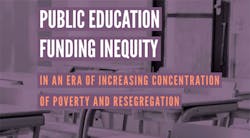Inequities persist in U.S. public schools, Civil Rights Commission says
Students who are black, Latino or come from low-income families too often end up in schools with deteriorating facilities, old textbooks and unqualified teachers, a report from the U.S. Commission on Civil Rights asserts.
The Associated Press reports that the commission's report, "Public Education Funding Inequity in an Era of Increasing Concentration of Poverty and Resegregation," points to funding inequities caused in large part by the reliance on local property taxes to provide funds to school systems.
"While school districts spend an average of $11,066 on each student each year, that number fluctuates drastically from district to district," the report says. Public schools in the U.S. are funded from a combination of local, state, and federal dollars. The revenue that local governments provide for public education is primarily generated from local property taxes, thus the funding provided for public education is largely tied to property values and the wealth of a community."
Noting that nearly 64 years have passed since the U.S. Supreme Court issued its unanimous Brown v. Board of Education ruling that ended legal segregation in public schools, the report says "the longstanding and persistent reality is that vast funding inequities in our state public education systems render the education available to millions of American public school students profoundly unequal."
For instance, 33 percent of high schools with high black and Latino enrollment offer calculus, compared with 56 percent of high schools with low black and Latino student populations. Nationwide, 48 percent of schools offer the rigorous math course.
The authors urge Congress to create incentives for states to adopt more equitable funding systems, to ensure adequate funding for students with disabilities and to increase federal aid to supplement underfunded for school district budgets.
About the Author
Mike Kennedy
Senior Editor
Mike Kennedy, senior editor, has written for AS&U on a wide range of educational issues since 1999.
